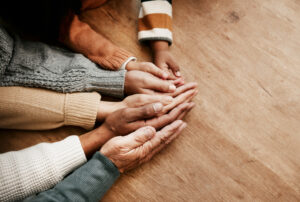We do not see things as they are; we see them as we are.
Anaïs Nin
A fundamental concept in neuroscience and human consciousness is that our judgments and views of the world often reflect our internal state. When we judge others harshly, we are frequently projecting aspects of ourselves onto them. This cyclical nature of self-judgment and external judgment perpetuates negativity in both directions.
This statement highlights how our biases, experiences, and unresolved emotions color our perceptions of others. Recognizing this can transform how we interact with others, especially during emotionally charged times like the holidays. It is also an opportunity to become aware of our feelings and perceptions of ourselves.
The Problem with Labeling
Labeling harms human relationships. A person is reduced to a single trait or behavior, creating a distorted and overly simplified view of who they are. This practice has far-reaching consequences, as it often justifies the mistreatment or dismissal of others.

Why are family triggers so strong?
- Shaping Early Patterns: Families create the emotional and behavioral frameworks that define how we view ourselves and others, so the dynamics often magnify the impact of labeling
- Unresolved Relationships: Family roles often freeze in time, leading to labels that may no longer be accurate. Relatives may carry labels in our minds from unresolved issues. A sibling who bullied you might still be labeled “the bully,” even if their behavior has evolved. A parent who didn’t meet your expectations may be labeled “critical” or “uncaring.”
- Comparative Dynamics: Siblings may have experienced the same parents differently, but we often assume our perspective is universal.
Labeling is Divisive
- Superiority Through Comparison: Labeling often involves assigning value judgments and creating a hierarchy. Seeing yourself as “X” and someone else as “Y” allows you to assume superiority, which can justify unkind behavior.
- The Essence of Conflict: Negative labels fuel hostility. When groups or individuals are labeled as “bad” or “inferior,” it becomes easier to justify mistreatment or exclusion.
Labeling is a Cognitive Distortion
In his book Feeling Good(1), Dr. David Burns highlights labeling as one of several disruptive cognitive distortions.
- Projection: Labels often project insecurities or judgments. For example, labeling someone “arrogant” may reflect discomfort with your own perceived flaws.
- “Should” Thinking: Believing others “should” behave a certain way leads to frustration and resentment when reality deviates from your expectations.
- Oversimplification: Labels oversimplify complexity. For instance, labeling a sibling as “mean” ignores the dynamics and struggles behind their behavior.
It isn’t them – it’s you
When triggered, our reactions usually stem from patterned experiences from the past rather than the present moment. The common impulse is to blame the person or circumstance. However, as Anthony De Mello, author of The Way to Love(2), profoundly stated,
Every time you find yourself irritated or angry with someone, the one to examine is not that person but yourself. Ask: What does this irritation tell me about me?
This perspective shifts the focus inward, encouraging self-awareness and fostering personal growth. Recognizing that our irritation with others often mirrors unresolved aspects of ourselves can transform annoyance into gratitude for the opportunity for self-discovery.
Labels vs. Descriptions
Epictetus, a Greek Stoic philosopher, highlights the difference between description and labeling. He emphasizes the importance of naming things correctly.(3)
“When we name things correctly, we comprehend them correctly without adding information or judgments that aren’t there.”
For example, Instead of saying, “She’s a drunk,” describe the behavior: “She drinks a lot,” or “He’s selfish,” acknowledge, “He prioritizes his own needs.”
Descriptions acknowledge observable traits or actions without projecting judgment or assumptions. This nuanced shift promotes empathy and understanding, allowing us to connect with others more deeply.
Labeling is judgmental and reductive while describing is observational and nonjudgmental. Labeling creates separation and hierarchy, often leading to mistreatment. On the other hand, description allows us to recognize someone’s behaviors or characteristics without assigning moral value to them.
Tools to live a kinder life – it is healing
To reframe your thinking and interactions, try these steps:
- Pause Before Reacting: When triggered, take a moment to reflect on your feelings before responding.
- Wish People Well: Extend kind thoughts toward others, even (especially) those who frustrate you.
- Avoid Negativity: Refrain from complaints, gossip, or unsolicited advice.
- Focus on Self-Awareness: Consider what your judgments reveal about yourself.
- Practice Gratitude: Use difficult interactions as opportunities for growth.
Holidays are a chance to practice
The holidays are a chance to challenge and transform long-held labels. Instead of focusing on what you think someone “should” be, try to:
- Acknowledge Complexity: Replace negative labels with nonjudgmental descriptions of behaviors. For instance, instead of “lazy,” consider “struggling to find motivation.”
- Seek Empathy: Ask yourself, What might this person be experiencing that I don’t fully understand?
- Focus on Connection: Let go of proving or defending your own labels. Instead, prioritize fostering understanding, and LISTEN.
Why Wishing Others Well Benefits You
A powerful exercise for breaking free from judgment is silently wishing people well. In coaching sessions, we often encourage participants to begin with those who irritate or anger them. Since your judgments (labels) reflect your inner self-judgment, you’ll become aware of what is in your brain and wish yourself well.
So, this exercise isn’t entirely altruistic—it’s deeply beneficial for the person practicing it. Our thoughts shape our brain’s wiring. A compassionate outlook rewires your brain to view the world (and you) more positively.

Allistair/peopleimages.com/AdobeStock
Conclusion
Labeling is a cognitive distortion that simplifies complexity at the expense of humanity. During the holidays, unresolved family dynamics can amplify these patterns, but they also present an opportunity for change. By reframing judgments, avoiding negativity, and practicing compassion, you can transform difficult relationships into opportunities for connection and self-awareness.
Replace labels with curiosity, seek understanding over criticism, and make wishing others well a daily habit. This shift reprograms your mind for positivity and fosters deeper, more meaningful relationships. In other words, “be nice.” You can’t control others, but you have choices regarding your reactions.
Who are you? Look at who and what you judge. Wish others well; you are flipping the switch from anger to joy and creating a new brain and reality. What do you really want from life?
References
- Burns, David. Feeling Good. Morrow Publishing, New York, NY, 1999.
- DeMello, Anthony. The Way to Love. Double Day, New York, NY, 1992
- LeBell, Sharon. The Art of Living. Harper Collins, New York, NY, 1994.
